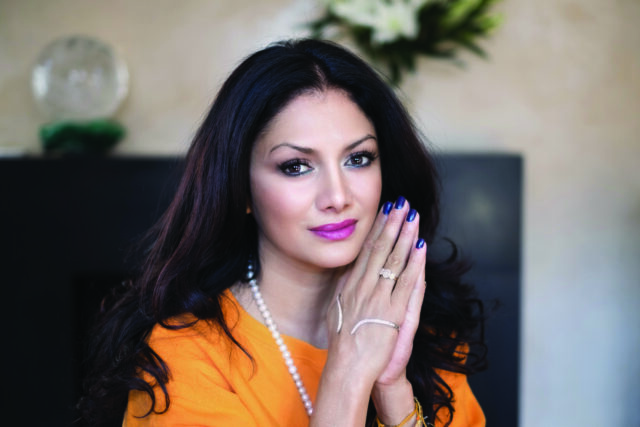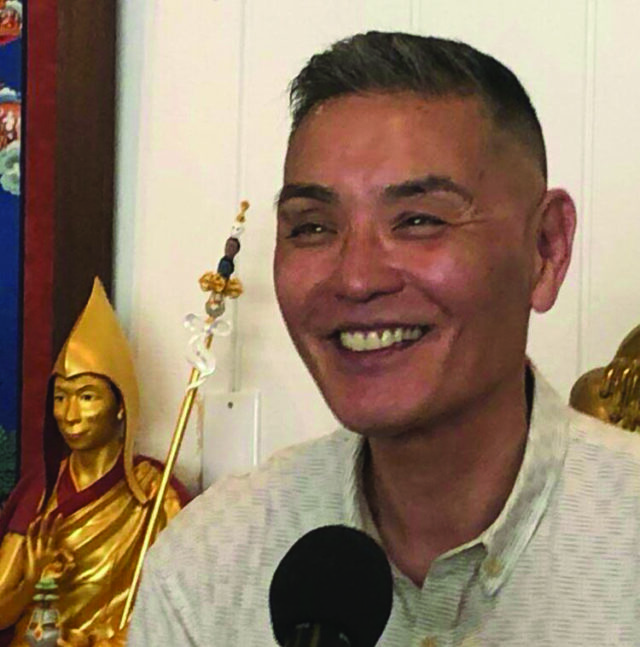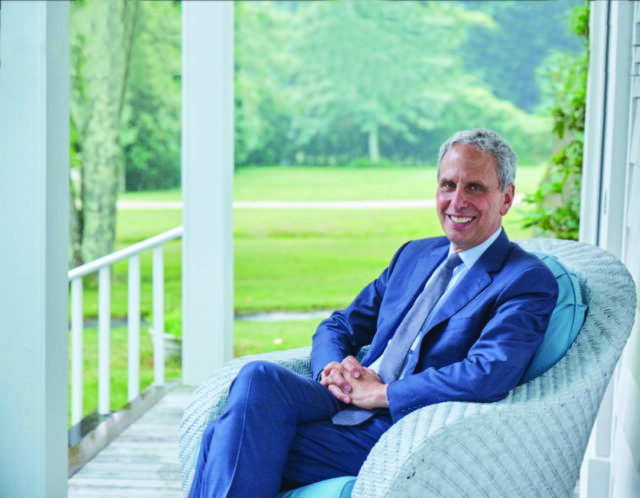
Donna D’Cruz
Meditation teacher, DJ
What kind of meditation do you practice?
There is only one kind of meditation. Stillness. How it is achieved is an individual choice. I have created a sacred life—Sankalpa enmeshed with a daily practice, a moment-by-moment meditation—don’t do it, live it, be it. My “Dip Into Bliss” meditation was created as an invitation to all to breathe, get present and invite stillness. Stopping the mind as a meditation becomes a non-exercise; in fact, it is a complete and utter cessation of thoughts. You achieve this by not doing. “By letting go, it all gets done,” said Lao Tzu in the Tao Te Ching.
In what ways has meditation changed your life?
Meditation has allowed the seeing of the unseen. It has opened windows to the invisible. Priorities and directions are different after meditation. What once seemed important is now irrelevant. What was before limited, is now limitless. Beauty is everywhere. Opportunity is everywhere.
What are the challenges and rewards of staying with it long term?
Meditation is a dive into a pool of bliss. The deeper you dive, the more the bliss. The key to meditation is stillness. Quiet that busy monkey mind and allow the soul to speak. Like Joseph Campbell said, “Follow your bliss and the universe will open doors for you where there were only walls.”
There are so many scientifically proven benefits of meditating. What do you find most beneficial about having a meditation practice?
Benefits and costs are dualistic references. In meditation, the concept of “benefit” dissolves into a state of knowingness beyond knowledge. Meditation is the key to knowing yourself. Like any love affair, the relationship with self takes equanimity, deep devotion and love to fully embrace all the challenges and joys.
Expert tip for how to begin?
Observe the breath. The in-breath, the out-breath, and eventually the point of the breath turning from out to in and in to out. Have no thoughts but your breath. That will keep you busy for the next few lives.
“A quiet mind is all you need,” said Nisargadatta Maharaj. “All else will happen rightly, once your mind is quiet. As the sun on rising makes the world active, so does self-awareness effect changes in the mind. In the light of calm and steady self-awareness, inner energies wake up and work miracles without any effort on your part.”
…And for how to sustain a regular practice?
Return to your breath whenever you have one minute of “waiting time.” Focusing solely on your breath will still the mind. Stilling the mind is the purpose of meditation. It can be done sitting, standing or walking. It can be done with eyes open or eyes closed. It is especially good on public transportation or while waiting for something. Whenever you find yourself waiting, take a deep clearing breath, let go of everything, and just observe your breath.
The key to meditation is:
Understanding that it is a release, a letting go, an invitation to access the infinite, the Divine.
My mantra of the summer is:
Who Am I?

Biet Simkin
Meditation and spiritual teacher
What kind of meditation do you practice?
I created something all my own, based on fourth-way principles and intense breathing practices, called The Guided By Biet Technique.
In what ways has meditation changed your life?
I have an amazing career, I have a partner of my dreams, I have a healthy child, I have a thriving community. This all came from meditation and prayer, but if you really want to know what I’ve got, it’s the ability to be calm in any circumstances, and to be steady and confident even when doubts arise.
What are the challenges and rewards of staying with it long term?
The challenge is you have to give up lots of bad things you may “love” like bad men, booze, drugs, gossip, judgment and so on. Everything that is out of integrity in your life will become glaringly obvious and meditation makes it too painful to keep on with those things. The reward is your life is a giant dream and what you always wished it would be; the payback is you don’t get the same level of distraction.
There are so many scientifically proven benefits of meditating. What do you find most beneficial about having a meditation practice?
Being able to stay clear on my aims and not get distracted. This way I live a life on purpose. A feeling of connection to my heart.
Expert tip for how to begin…and for how to sustain a regular practice?
Just start! Two minutes a day, grow it to 10 minutes a day. Find your meditation rock star. Find someone who has what you want and begin to follow them and emulate their magic. It will grow in you!
The key to meditation is: Relaxing.
My mantra of the summer is:
“My life is perfect, there are no mistakes, the timing is perfect.”

Neil Toyota
Resident teacher, Kadampa
Meditation Center The Hamptons
What kind of meditation do you practice?
The goal of our meditation practice is to learn how to develop and maintain a peaceful mind all the time, meaning both in meditation and in our daily lives. A basic principle is that happiness and suffering are states of mind, and so their causes cannot be found outside the mind. If we want to be truly happy and free from suffering, we need to learn how to control our minds, both in meditation and in our daily lives.
In what ways has meditation changed your life?
I’ve learned that every aspect of life can be changed through the practice of meditation. Through practice, we “train” in love, compassion, patience, gratitude and other happiness-causing states of mind. At the same time, we can learn to recognize and let go of those states of mind that are the cause of unhappiness, such as anger and blame, impatience, and grasping at external objects as causes of happiness.
Over time, it became clear that Buddhist meditation practice was not merely an effective coping mechanism or a powerful modality for improving mental and physical health, but also a lifestyle. I went from looking for a quick fix to eventually becoming a full-time instructor of Buddhist meditation.
What are the challenges and rewards of staying with it long term?
As with attempting and then sustaining anything new, there are some common challenges to a meditation practice. These can include a lack of familiarity with what to do and therefore frustration, the absence of quick results and therefore disappointment, or simply bad habits and distractions. These challenges can become obstacles so that we actually abandon the practice or only half-heartedly engage. The reward of a long-term effort is that we actually begin to experience the results we seek, such as a reduction in stress, greater focus and productivity, improved relationships and a general state of well-being. The ultimate reward of a meditation practice is the development of sustained inner peace and happiness, and protection from inner problems and unhappiness.
There are so many scientifically proven benefits of meditating. What do you find most beneficial about having a meditation practice?
The most beneficial result of having a meditation practice is being able to cultivate and maintain peaceful and happy states of mind, regardless of external conditions.
Expert tip for how to begin?
As with any successful endeavor, the best way to begin a meditation practice is with a clear intention or aspiration. If you want to meditate to reduce stress, clearly articulate that as your motivation. If general well-being is your goal, that’s a good reason too.
…And for how to sustain a regular practice?
One way to try to sustain a practice or routine is through sheer personal willpower, without a network with whom to share your activity. Most of us know from experience that this approach doesn’t always work, if it works at all. An approach with a more likely chance of success is to combine personal practice with group practice. A regular meditation practice can come from developing a routine, spending some time in group meditation and personal time at home. Know what works for you, and stick with it.
The key to meditation is:
Relax and enjoy it. If you’re doing a breathing meditation, relax and enjoy the experience of the breath, without pushing or straining. Allow yourself to “taste” the inner peace that comes just by concentrating the mind. From these small experiences, you can naturally and gradually develop an enjoyable and rewarding meditation practice.
My mantra of the summer is:
A practical summer mantra, good for Buddhists and non-Buddhists alike, is “May everyone be happy.” In any situation, you can recite this general mantra, or more specifically, “May you be happy.” It’s a mantra that’s the nature of love, and is best recited silently from the heart and expressed with a smile.

Bob Roth
CEO of the David Lynch Foundation
What kind of meditation do you practice?
I practice Transcendental Meditation, a simple technique that I do sitting comfortably in a chair with my eyes closed. It gives my body a very deep rest and wakes up the creative networks in the brain.
In what ways has meditation changed your life?
Oh, big question! I have been meditating for 52 years, so that is hard to quantify. Looking back, I find a continually deepening inner equanimity, a rock-solid foundation to the inevitable highs and lows of life. Plus, I sleep great, I have not been sick with a cold in decades, and I have more energy now than I had when I was in my 20s.
What are the challenges and rewards of staying with it long term?
Each day I make meditation a priority. I mean, there are 1,440 minutes in a day and I figure if I can’t find a few minutes each day for this kind of self-care, then I need to re-prioritize my life! It’s also helpful that TM is very enjoyable to do. There is no strain, no harsh “do’s and don’ts” involved.
There are so many scientifically proven benefits of meditating. What do you find most beneficial?
Of course, the reduction of stress and better health. But for me, I love the benefits of meditation for my mind, my brain. These include very clear thinking, an ability to focus on something without distraction for very long periods of time, and, as I said, benefits for awakening the creative and problem-solving networks in the brain. Life is about choices and problem-solving. And meditation helps a ton with that.
Expert tip for how to begin?
First, look at the research that supports the benefits. Meditation is not about a fad or marketing or branding. It’s about what actually happens in your brain, your nervous system, your cardiovascular system, respiratory system, digestive system during the few minutes that you are sitting in meditation. Once you
decide what technique appeals to you, make the decision to learn it, to do it. Find an experienced teacher and start. It is a decision that will pay dividends for the rest of your life.
…And for how to sustain a regular practice?
The key is to find the right technique. All meditations are not the same. There are different techniques with different mechanics and different outcomes. Once you find one that fits you then, again, resolve to do it, regularly as prescribed, for a month or two—enough time to begin to get a sense of the benefits. And then each day, recommit to the importance of your good health and meditate—as you do with a healthy diet or proper exercise program. For me at least, TM is so easy and rejuvenating that it’s easy to continue.
The key to meditation is: Naturalness.
My mantra of the summer is: Enjoy.





